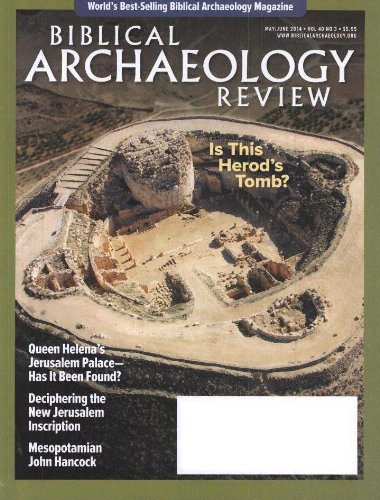Book review: Biblical Archaeology Review
★★★★★
Let me take a break from book reviews to plug my favorite magazine. Biblical Archaeology Review (BAR) is published bi-monthly, providing thought-provoking articles and touching on the latest biblical finds. I find it far from dry, enjoyable by laymen and hardened scholars both. BAR prides itself on objectivity, favoring neither believers nor unbelievers, but let’s face it: history is secular, and controversial writing sells, so you’re likely to find more controversy than inspiration. Yet, the scholarship shines, perhaps because any article’s illogical conclusion is likely to be ripped apart by argumentative experts in the next issue.
The most recent issue (March/April 2011) features the following topics:
Jerusalem Roundup: An up-to-the-minute report on the archaeological activity in Jerusalem.
Solomon’s Temple: Recent excavations of ancient Near Eastern temples shed light the structure of King Solomon’s temple.
“Revolt” Coins: During the Jewish revolt in 66 CE, Herod’s Temple Mount became a hub for rebel coin minting.
The Oxyrhynchus Papyri: You may have never heard of these priceless documents, discovered in Egypt over a century ago, portraying the beliefs and daily lives of ordinary Romans and Christians.
If you want your finger on the pulse of the latest thinking in Biblical studies and archaeology, this ‘zine is a must.












 354 Circles
354 Circles
 603 Goodreads Friends & Fans
603 Goodreads Friends & Fans

 Hello! I'm an author, historical Jesus scholar, book reviewer, and liberal Christian, which means I appreciate and attempt to exercise the humanitarian teachings of Jesus without getting hung up on any particular supernatural or religious beliefs.
The Bible is a magnificent book that has inspired and spiritually fed generations for thousands of years, and each new century seems to bring a deeper understanding of life’s purpose. This is true of not only Christianity; through the years, our age-old religions are slowly transforming from superstitious rituals into humanitarian philosophies. In short, we are growing up, and I am thrilled to be riding the wave.
I avidly read all thought-provoking religion titles. New authors: I'd love to read and review your book!
Hello! I'm an author, historical Jesus scholar, book reviewer, and liberal Christian, which means I appreciate and attempt to exercise the humanitarian teachings of Jesus without getting hung up on any particular supernatural or religious beliefs.
The Bible is a magnificent book that has inspired and spiritually fed generations for thousands of years, and each new century seems to bring a deeper understanding of life’s purpose. This is true of not only Christianity; through the years, our age-old religions are slowly transforming from superstitious rituals into humanitarian philosophies. In short, we are growing up, and I am thrilled to be riding the wave.
I avidly read all thought-provoking religion titles. New authors: I'd love to read and review your book!
 Hi! While Lee writes the articles and reviews the books, I edit, organize, and maintain the blog. The views expressed here are Lee's but I'm his biggest supporter! :-)
Hi! While Lee writes the articles and reviews the books, I edit, organize, and maintain the blog. The views expressed here are Lee's but I'm his biggest supporter! :-)
We often read or hear that some researchers doubt the historicity of events mentioned in the Bible. This is especially true about tales of the Fall, the Flood, the tower of Babel, and miracles that were described in the Gospels. These are accounts that researchers regard as unreliable. They may think them to be legends or myths, and think them unworthy of serious consideration.
We are going to study this difficult subject by considering many examples. This study is especially designed for people who sincerely want to study the historic accuracy of Biblical accounts.
In the text we will introduce many archaeological discoveries that support Biblical accounts. They have many times confirmed information originally found in the Bible.
The source: http://www.jariiivanainen.net/Bible_and_the_history.html